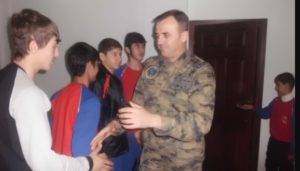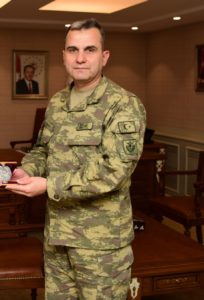Senior military officers who were alleged to have compromised themselves in sex scandals and risked blackmail by a criminal gang seeking to acquire classified information were promoted by the Turkish Armed Forces (Türk Silahlı Kuvvetleri, TSK), a Nordic Monitor investigation has found out.
The scandalous revelations that several high-ranking Turkish officers were identified by a gang to obtain classified information were first made in May 2012, when police raided the homes and offices of gang members. During the search investigators seized hard disks and flash drives that led to the discovery of hundreds of videos showing Turkish officers and government employees in compromising situations.
The gang was using escort women to set up honey trap schemes, offering sexual favors to officers in exchange for classified military information. Those who were not willing to go along with the demands voluntarily were threatened with an exposé, according to an indictment filed against the gang members.
One of the officers marked by the gang was Lt. Col. Halil Akar, whose file stated that he could be exploited with the threat of a video recording of him having sex with boys during a trip to Phuket Island in Thailand. The recording was made by a man identified only by his first name Nihat, a friend of the gang who was in the travel and tourism business. Akar took the trip when he was stationed in Bangladesh to attend to a prestigious military school there.
The gang believed Akar, the head of the NATO Response Force’s (Mukabele Kuvveti in Turkish, NMK) Turkish unit at the time, would be instrumental in the entrapment of officers in the Special Forces Command (Özel Kuvvetler Komutanlığı, ÖKK) and would manipulate them to gain access to highly confidential documents from the archives. The ÖKK plan, developed by the gang, detailed a sophisticated scheme of luring officers with escort women and cash rewards in order to obtain confidential documents from the military.
Despite the serious allegations, Akar was protected from criminal investigation by the government of Presdent Recep Tayyip Erdoğan. He served as commander of the airfield in Muş until August 2016, when he was promoted to head the Personnel Plan Management Department in the Turkish Air Force.
The troubling revelation about the ÖKK plan that targeted the Special Forces was uncovered by investigators working for the Izmir Chief Public Prosecutor’s Office. Police came across an encrypted file named Pandora in a seized hard drive that was found during the execution of a search and seizure warrant in the summer home of the main suspect, Bilgin Özkaynak, the organized crime boss.
The encryption was cracked by IT specialists who were authorized by the court, and the content of the file revealed the names of assets, operatives, marks and a huge archive of secret military and government documents obtained through honey-trap and other schemes.

A document titled “Özel KuvvetlerKomutanlığı.docx” and found in the seized evidence laid out a specific plan targeting several officers in the Special Forces Command. The gang identified Col. Mehmet Davulcu, the head of the Central Department (Merkez Şube Müdürlüğü), as the person whose role would be important in the assignment and promotion of officers to key positions in the Special Forces. It noted that Davulcu could be convinced to do the gang’s bidding in assignments under the threat of blackmail over his daughter’s pornographic videos.
The ÖKK plan also profiled Lt. Col. Şahmurat Akgün from the Combat Search and Rescue (Muharebe Arama Kurtarma, MAK) Regiment Command and Maj. A. Gökhan Kayılı from the Special Department (Özel Şube Müdürlüğü) as two people who were involved in planning, intelligence coordination and follow-up operations. “The most obvious weakness of both these officers is their fondness for women,” the profile pointed out.
Akar was described as a clever and connected man who could use these two womanizing officers in setting up a scheme to record their sexual affairs and as such force them to share secret documents from their units. Akgün retired from the military and in November 2014 joined the neo-nationalist Homeland Party (Vatan Partisi, formerly the Workers’ [İşçi] Party), an ally of President Erdoğan and a staunchly anti-Western political party.
Another military member, Chief Sgt. Pehlül Şahin, who was responsible for an archive room where secret documents were stored, was identified as having a soft spot for money. His weakness could be easily exploited to gain access to all kinds of information and documents, the profile note under the ÖKK plan said.
Lt. Col. Yüksel Kolcu was also among the marks whose sex videos recorded in a massage parlor the gang said could be used when it was necessary to convince him to follow its orders. Kolcu also kept his position in the Turkish military and is currently commander of the Land Forces military school for noncommissioned officers in Balıkesir.
The plot targeting the Special Forces Command was coordinated with İlkay Altındağ, a staff colonel at the Land Forces Command, according to the file. Altındağ was entrapped when his affair with an escort woman named Esra (her real name was identified in the court case file as Sibel Er) was recorded and used to force him to work for the gang. The profile note about him said that “he needs to be generously rewarded” after he agreed to work with the gang. “He wants to meet the Chief [Reis],” it added, referring to gang leader Özkaynak, who ran the entire scheme with his point man Coco, a code name for former Col. Coşkun Başbuğ, who worked in military intelligence.

Altındağ was also provided political cover by the Erdoğan government, which shielded him from criminal prosecution and helped him escape punishment. He was released in February 2013 pending trial. The criminal case against him and other gang members was quashed by President Erdoğan in February 2016.
He was promoted to brigadier general in 2018, and the Erdoğan government used him to run special operations in Libya, where he previously served as military attaché on special assignment in 2012. He trained Azeri and Albanian troops and served in Iraq and Syria on various assignments. He had been commander of the special forces base in Kilis province, near the Syrian border, until 2019.
Among the thousands of pages of secret documents the gang managed to acquire were classified NATO and FBI documents that were shared with the Turkish government as a member of the alliance.
Many officers who were named in the document as leaking confidential documents returned to their duties in the Turkish military, advancing up the ranks despite their controversial records. As if hushing up the investigation were not enough, the Erdoğan government also punished the prosecutors and police chiefs who exposed the gang and investigated their activities. Most of the investigators who were involved in unmasking the gang were either purged or jailed by the government.
By: Abdullah Bozkurt
Source: Nordic Monitor



